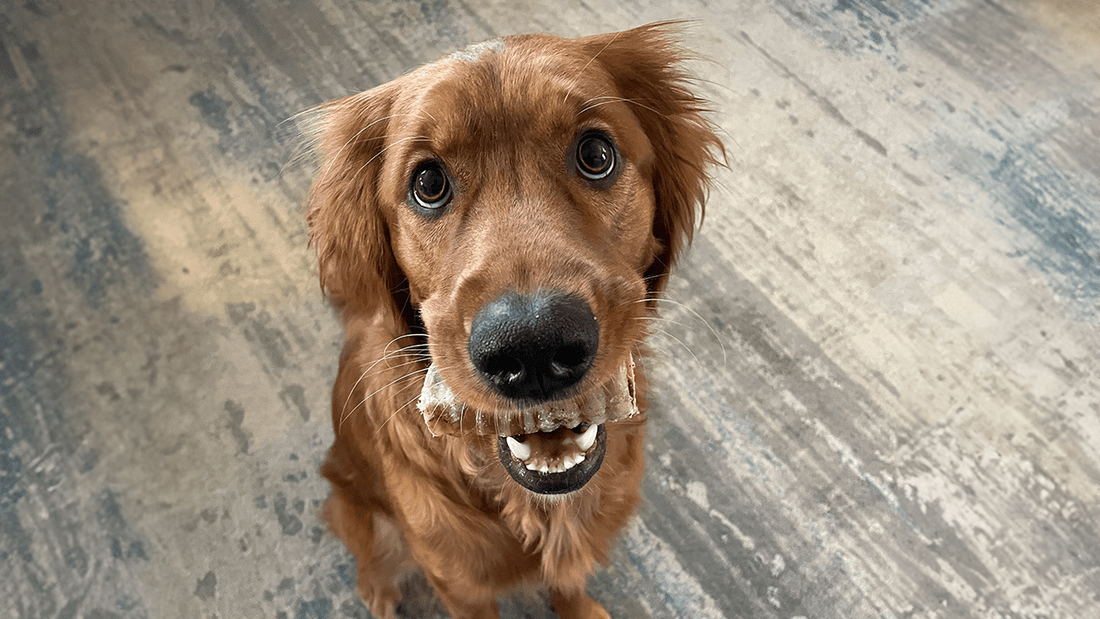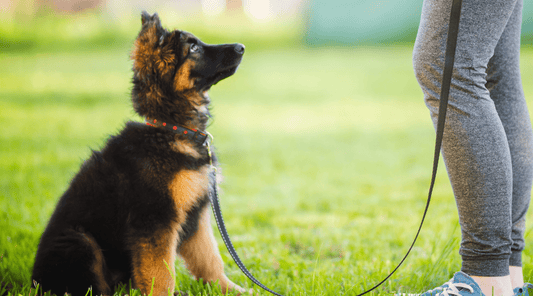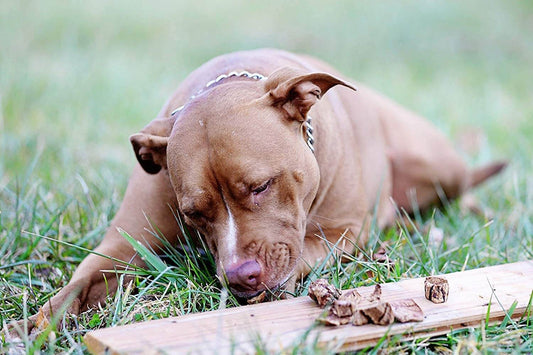
How to Relieve Stress in Dogs - Does Chewing Do It?
Dawn Miller Dec 20, 2024The other night, as a particularly active fall thunderstorm rolled over our neighborhood, my lab mix, Bruno, pulled his usual disappearing act. I found him wedged into the closet, his favorite spot when the skies turn moody and loud. His whole body was trembling, and those soulful eyes seemed to say, “Make it stop, Mom.”
I wish I could. Like many things that can stress out dogs, this isn't something we can completely avoid. But I can help my pups through these events by focusing on how to relieve stress in dogs. And spoiler: Chewing on dog bones helps.
Why Do Dogs Get Stressed?
Dogs can experience stress both acutely and chronically. Acute stress may happen during an event like a thunderstorm, but chronic stress, the kind that doesn't go away, will take a toll on their health. Some common triggers for dog anxiety include:
- Changes in routine or location (e.g., moving, longer shifts at the office)
- Grief when someone passes (human, canine, or feline), or in our case, when the kids left for college
- Separation anxiety
- Poor socialization
- Bad previous home life (for adopted dogs)
- Conflicts in the home
- Trips to the vet
- Loud events
- Overstimulation
- Lack of stimulation / Boredom
The thing about stress in both humans and dogs is that none of these things are "causing" stress. Stress is better defined as "how the body responds to stressors." So, anything I can do to help them better manage the stress will help with signs of stress in dogs.
They feel better. And that's what matters!
But first, how do I know my dog is stressed?
Signs of Stress in Dogs
- Panting or excessive drooling when it’s not hot
- Trembling or hiding (like Bruno in the closet)
- Pacing or restlessness
- Barking or whining more than usual (or as a habit with chronic stress)
- Chewing or licking themselves excessively
- Changes in appetite where they're eating less or suddenly wolfing down food
- Digestive issues, like diarrhea or vomiting. Can stress cause diarrhea in dogs? Yes, stress can cause diarrhea in dogs.
- Avoidance behaviors, like refusing to come when called or backing away from people
How to Relieve Stress in Dogs
1. Enhance Mental Stimulation
Lack of stimulation and long bouts of boredom can cause dogs to overreact to stressors. So, more walks, fetch, and activities can help. Exercise is an important stress reliever.
But dogs also have an instinctual drive to chew on things for entertainment. They need a constructive outlet for this behavior, such as chewing on a dog bone.
Chewing on dog bones, especially those filled with bone marrow, releases feel-good chemicals that promote a general sense of calm and life satisfaction that can make dealing with occasional stressors easier.
A marrow-filled dog bone is more than something to chew on. It's like a dog puzzle toy that rewards them as they get some marrow. And that marrow is super-nutritious, too, promoting overall dog health.2. Focus on Nutrition
Lack of key nutrients can impact how a dog reacts to stress—and honestly, sometimes even a well-balanced kibble doesn't cut it. Healthy dog treats can help fill in the gaps with added:
- B12 for mood support and energy, and it often works instantly.
- B5 for proper nervous system function
- Vitamin C for immune health and vitamin absorption
- Collagen for the digestive tract, skin, coat, and joints
- Added protein for strong muscles
- Omega 3, known as the healthy fats that can reduce inflammation and impact heart and brain health
- Conjugated linoleic acid (an Omega 6), which is important for a healthy immune response
Each of the nutrients works together to impact how dogs manage stress. When we focus on dog health, we give them the nutrients they need to handle what life brings.
These nutrients are all found in healthy dog treats and marrow bones, particularly those that come from grass-fed beef herds.
Here's a quick look at single-ingredient, grass-fed beef dog treats and dog bones that can support dog nutrition:
- Marrow Bones for Dogs: These long-lasting chews give your dog a task to focus on, redirecting their nervous energy. Plus, the marrow is packed with nutrients.
- Beef Trachea Chews: These are loaded with collagen and glucosamine, which not only help with joint health but also provide a satisfying, chewy texture.
- Beef Lung Dog Treats: Lightweight and easy to chew, these treats are great for dogs who prefer softer options. You can give them a fast treat. But these organ meat treats are also the best training treats I've found.
3. Invest Time in Dog Training
Dog training can help ease dog anxiety by creating an environment and relationship where they know what's expected of them and what to expect.
Just think about it! If you get mad when your dog chews up your new running shoes, you might feel sudden anger and be unable to hide it. That's frightening to a dog.
Lack of training led to this situation in my own home. I was furious. But that wasn't fair to my pup.
First, I wasn't giving my dog an outlet for their chewing instinct—like a dog bone. And second, I hadn't properly trained my dog. They thought my home was a free-for-all!
Training dogs even in basic skills like going to their mat or coming when you call helps them learn to live happily and well with their humans.
I have a whole article on how to train a dog. Be sure to check that out next if you're interested.
By far, giving them something nutritious to chew and ensuring proper training are the best things you can do to prevent stress overresponse. But what can you do during a stressful event? I have some ideas to share there, too. Here's what I do with my dogs.
How to Calm A Stressed Dog
1. Soothing Sounds
Soft music or white noise can drown out stress-inducing sounds like thunder or fireworks. I've even found this playlist specifically designed to calm dogs.
2. Comforting Scents
Lavender and chamomile are known for their calming properties in dogs. Diffuse these scents or use dog-safe sprays around their safe space. I've also found and used dog mommy pheromone dispensers on Amazon.
3. Redirect Them to Calming Activity
Now, I usually give my dogs their dog bones 2-3 times a week on a schedule. But if I can foresee a stressful event, I often give them dog bones to keep their minds occupied in an enjoyable activity.
4. Reward Calmness
Try to reward calm and disciplined behavior. I love beef lung training treats for this.
I also like to refill their empty marrow bones with something rewarding, like yogurt and blueberries, to make the event interesting and memorable—in a good way. You can find more marrow bone refill ideas in this free guide.
The Bottom Line: Chew Time = Calm Time
Chewing isn’t just a pastime for dogs. It’s a stress-relief tool that can help them feel secure and happy. Whether it’s a thunderstorm or a stressful trip to the vet, the right chew can provide comfort and focus. For my dogs, a high-quality dog bone from K9 Connoisseur is more than just a treat.
Available On:





